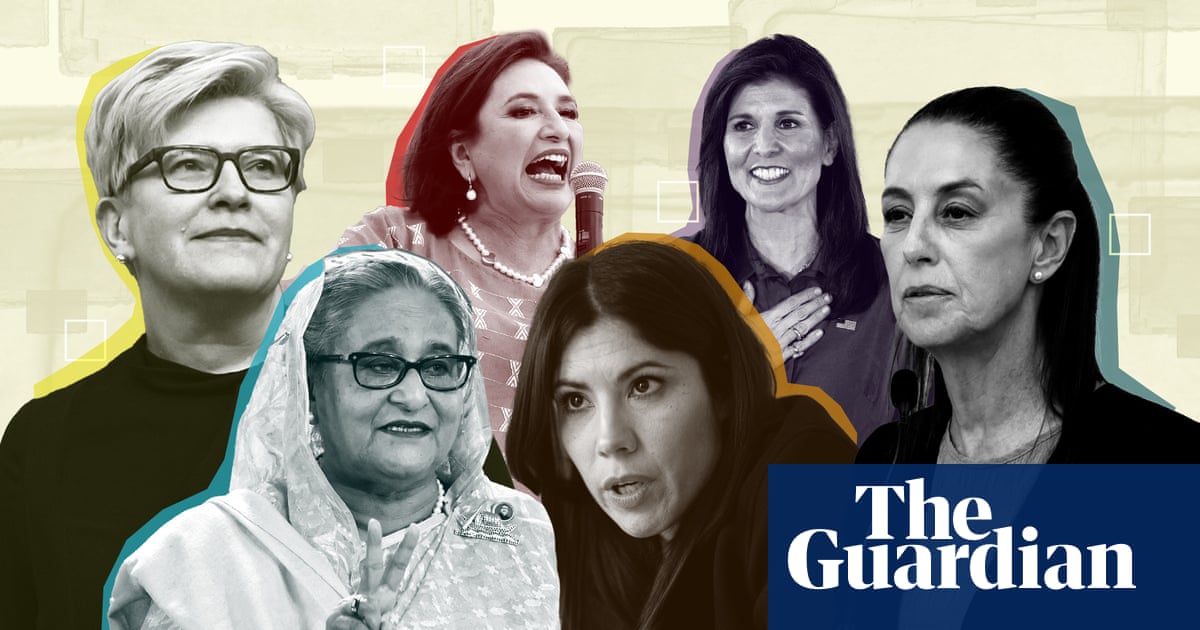With more people set to vote in elections than at any time in history, 2024 is being touted as a test of democracies’ strength around the world, but one thing remains in noticeably short supply – female leadership candidates.
Analysis from the Guardian shows that of the 42 elections – both presidential and parliamentary – in which the country’s leader is being selected and where candidates have been declared, just 18 have women in the running to be leader. In just a handful of countries do women have a reasonable chance of winning – based on polling averages and the historical results of the parties they are running for.
With a combined population of more than two billion, elections in the world’s biggest democracies – the US, Indonesia and India – have, or had, no female frontrunners. The same is true of votes in the UK, Pakistan and South Africa.
The challenges faced by female politicians are perhaps best exemplified in the United States – the world’s richest country – where female representation in politics still lags behind many other wealthy nations. Hillary Clinton made history as the first woman to win her party’s nomination in 2016 – while Kamala Harris became the country’s first female vice-president in 2021 – but Republicans had to wait until March 2024 for a woman to win a state primary, with Nikki Haley’s victory in Vermont coming less than 24 hours before she suspended her presidential campaign.
Polling shows that in general, Americans are open to electing a female leader. A 2023 survey from Pew Research found that 53% of the population say there are too few women in high political offices, while 81% accept that female politicians have to do more to prove themselves than their male peers.
But when it comes to why voters continually fail to select female candidates, studies show that their stated reasons are often more nuanced – and therefore harder to combat.
Stanford university researchers point to what they call pragmatic bias, a phenomenon in which voters who may prefer a female candidate still fail to vote for her because they believe it will be too difficult for her to win, as others in the electorate won’t support her.
The issue of pragmatic bias is borne out by that same Pew Research survey, which found 80% of voters at least partly believe that other Americans aren’t ready to elect a woman to higher office.
Mexico’s first female president
Directly south of the US border, an entirely different dynamic is at play. On 2 June, Mexico will hold an election in which voters are poised to elect a female president for the first time. The historic result was all but guaranteed in September, after former Mexico City mayor Claudia Sheinbaum was selected as the ruling party’s nominee, to face off against centre-right senator Xóchitl Gálvez.
When Sheinbaum and Gálvez entered politics at the start of the millennium, more than 80% of the country’s senators were men. Today the majority are women, a result, analysts say, of a concerted efforts to increase representation.
In 2019, Mexico enshrined parity of representation in its constitution, meaning that if parties fail to field at least 50% female candidates, they can be barred from competing.
Since the 2018 election, more women have won state governorships than in the entire history of the country. Mexico’s parliament now has the joint fourth-highest level of female participation of anywhere in the world.
However, Mexico’s successes when it comes to female representation in politics stand in stark contrast to the broader challenges facing women in the country.
Studies show women remain seriously under-represented in boardrooms, are paid significantly less than their male counterparts and are more likely to work in the informal economy. Mexico also remains mired in gender-based violence, with government data released in 2022 showing an average of 10 women or girls killed daily.
The quota question
Studies have shown that increasing the representation of women in politics is a huge factor in improving outcomes for women and girls. Jéromine Andolfatto, a policy and campaign officer with the European Women’s Lobby, points to recent examples in Spain and France as indicative of this.
Spain’s 2019 parliament, in which women’s representation hovered at about 43%, shepherded the passing of landmark legislation that makes consent a key determinant in sexual assault cases. In France, an influx of female politicians in 2017 and 2022 paved the way for the passing of a law against sexist violence and another promoting gender equality in the workplace and educational settings.
“Obviously it doesn’t mean the laws passed are perfect,” Andolfatto says. “But you can see that there are improvements being made and that women’s rights are a bit of a higher priority.”
A 2023 study by the European Women’s Lobby found that binding quotas on female candidates – like those seen in Belgium, Spain and France – were the most effective way to fast-track women’s representation and cultivate a political culture that could allow women access to the upper echelons of power.
In countries with legislated quotas for candidates, women’s share of parliamentary seats increased from 18% in 2004 to 34% in 2021, Andolfatto says.
“So it’s slow progress, but it is still better than countries that have no quotas.”
Even as countries like Mexico, Spain and France offer a blueprint of how to achieve gender equality at the top of politics, data shows that progress around the world is slowing.
In 2023, the number of UN member states with female leaders fell to 12, down from 17 in 2022. UN Women predicts that at the current rate, gender equality in the highest positions of power will not be reached for another 130 years.







